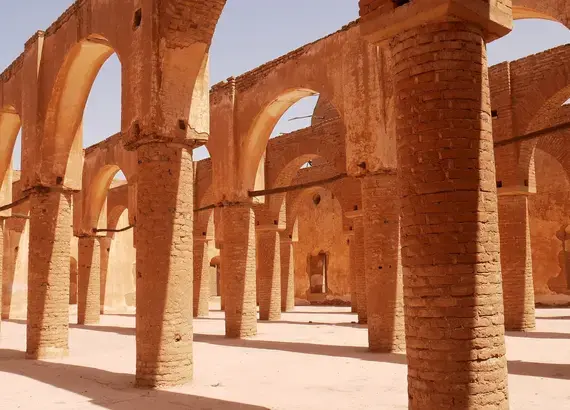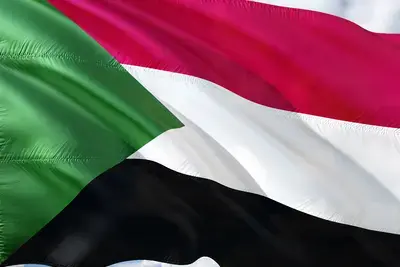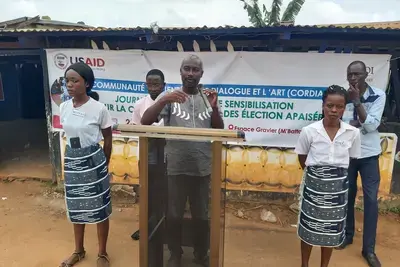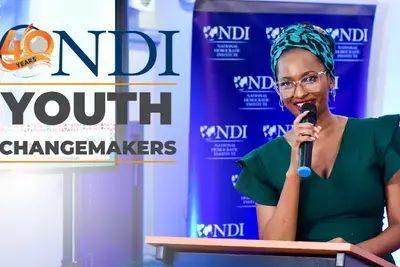
Success Story
Youth-Led Dialogues Bring Ethnic Groups Together in Sudan
When Asaad (name changed to protect identity) heard that he was invited to a Madania (civilian-led) forum with other citizens in his town, Kassala, Sudan, he had to stop and think carefully about whether it would be wise to attend. Kassala, the capital of the state and a border trade hub known for its views of the Taka Mountains, was filled with intergroup tension. To Asaad, attending a forum with members of other ethnic groups sounded dangerous.
“I was hesitant,” Asaad remembers. “I held a consultative session with my Native Administration [a form of traditional local leadership] leaders, to assess the situation and decide. We decided to take part, but we were quite sure that it would end in conflict or even violent actions.”
The Madania forum, organized by NDI and its civil society partner, Shemoos Organization for Sustainable Development, in early 2023, was part of a two-year effort to foster dialogue between youth and local decision-makers in five states across Sudan. While this was a local event, focused on local problems, today many of Sudan’s civilian leaders are working to end a devastating war between the Sudanese Armed Forces (SAF) and the paramilitary Rapid Support Forces (RSF) which began in April 2023 and has upended the country. The route through which they will achieve peace is still unclear, but Kassala’s Madania forum serves as a model for how Sudan’s young people can play an important role in identifying solutions, fostering dialogue, and bridging gaps in their communities.
Despite making up more than 60 percent of the population and playing a vital role in the revolution that toppled dictator Omar al-Bashir, Sudanese youth have been largely excluded from decision-making. Political leaders tend to view them with suspicion or condescension, leaving their enthusiasm for new, more democratic approaches untapped. NDI sought to shift these dynamics by supporting young people in resistance committees (RCs) – informal, grassroots neighborhood networks of Sudanese citizens – in five states across Sudan. In late 2022 and early 2023, NDI partnered with a community-based organization in each state and trained 114 young RC members (49 women, 65 men) to methodically research their community’s political priorities and then strategically advocate for those priorities to local decision-makers. NDI also facilitated workshops on principles of civic participation and democratic engagement skills. This work culminated in a Madania forum in each state, during which RC members presented their research findings and constructively discussed potential solutions with a wide range of local stakeholders.
In February 2023, Asaad joined the Madania forum in Kassala, sitting down cautiously with representatives from businesses, labor unions, civil society, RCs, and Native Administrations. People who would not often have access to decision-makers – namely women and youth – were well represented, and members of different ethnic groups met face-to-face. A young RC member who took part in the community research and a Shemoos staff member, who served as facilitators, began by presenting the research findings, setting the table with facts about what issues people across Kassala considered important, and soliciting feedback. In some cases, the forum participants pushed back on the findings, insisting, for example, that drugs should be added to the list of local problems, and their comments were noted for later inclusion in the research reports. The facilitators started with issues that are common to all, such as the shortages of basic services. They then waded into more difficult topics, such as the inability of youth and women to influence politics.
Finally, the facilitators opened up the most difficult topic in Kassala: conflict between different ethnic groups in the state. Through careful facilitation, the conversation proceeded. Despite the strong emotions this topic evoked among participants, everyone stayed in their seats, and everyone had their say. By the end, the participants agreed that regardless of background, there is a set of compatible interests across ethnic groups. “By the end of the event,” Asaad remembers, “we were all impressed and inspired with the sense that we can tolerate and cooperate with one another. The environment provided played a significant role in creating a meaningful, objective meeting.”
Inspired by the forum, Mohamed (name changed to protect identity), a young representative of the Native Administration for the Habab ethnic group, took it upon himself to take the agreement between local leaders one step further by creating a new initiative to promote community cohesion and reduce hate speech.
“The Madania forum positively contributed to expanding our understanding as young people active in addressing social issues, and as indigenous leaders on issues of peace and coexistence,” Mohamed explained. “The workshop helped to organize our ideas through thoughtful discussions with others, and from that perspective, I developed the initiative.” Mohamed’s project, which includes community leaders from across Kassala state, includes activities to raise awareness around social cohesion and prevent hate speech at the local level and convenes local leaders to discuss joint community issues and prevent conflict.
While Kassala is currently away from the front lines of Sudan’s ongoing conflict, Mohamed has continued to work with other ethnic group leaders, as well as a range of youth from across ethnic lines, to promote peace in the community. In October 2023, following a rise in tensions over the distribution of mining revenues, Mohamed’s initiative convened a meeting of all Native Administration leaders across the state, where they signed an agreement reaffirming their commitment to prevent hate speech and pursue legal avenues for dispute resolution. His initiative provided a local solution to local conflict. As Sudanese leaders continue to look for ways to achieve peace at a national level, young people like Mohamed are building bridges in their communities, mitigating local conflicts that might otherwise flow into the wider war. They offer a model and inspiration for the types of innovative, democratic, youth-led solutions that Sudan needs to bring its people together.



